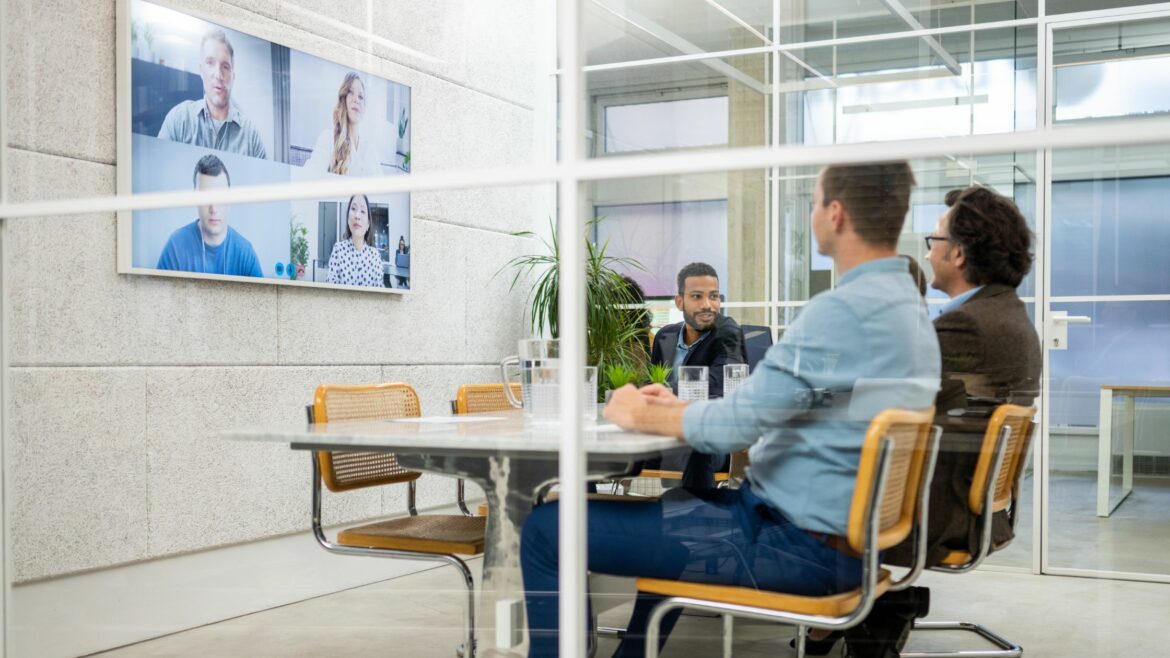Whether your organization aims to add flexibility to a traditional work model or require in-office time for remote workers, managing a hybrid workforce is a balancing act. If you’ve already started testing a hybrid model, you’ve probably run into issues like these:
- Communication isn’t consistent.
- Employees struggle to feel connected.
- Company culture is nonexistent.
With careful planning and proactive problem-solving, you can design a hybrid approach that works for everyone. Whether your organization aims to add flexibility to a traditional work model or require in-office time for remote workers, managing a hybrid workforce is a balancing act.

1. Allow time- and location-based flexibility
It’s easy to assume that the biggest perk of a hybrid arrangement is the ability to work from anywhere. Although hybrid employees appreciate the option to work from different locations, time-based flexibility is just as essential for this workforce model.
According to a 2022 Gartner survey of hybrid employees, those who get to choose when they work are 2.3 times more likely to achieve higher performance metrics. Giving employees autonomy can decrease fatigue by 1.9 times while boosting productivity and mitigating burnout.
Complete time-based flexibility may not be realistic for your organization. For example, you may need to assign work schedules to ensure coverage across different time zones.
But whenever possible, allow hybrid and remote team members to choose when they work. Set expectations for what they should achieve to give their workdays sufficient structure. Here are two options to consider:
- Require employees to work a certain number of hours per day or week. Setting limits can help them feel like they don’t have to work all the time, which can create a better work-life balance.
- Assign deadlines or quotas and allow employees to choose their own hours. Giving employees increased autonomy can help your organization focus on the value of the work rather than the hours.
2. Assign independent and team work
If your organization is transitioning to a hybrid approach from an in-office model, you can expect employees to feel less connected to peers. Employees who once interacted with team members throughout the workday might begin to feel isolated—especially if their work has become largely independent.
According to the HubSpot 2023 Hybrid Work Report, only 34% of hybrid employees feel connected to their colleagues. That disconnect can lead to unhappiness and high turnover rates. In fact, feeling connected to colleagues is a significant factor in employee retention for 67% of hybrid workers.
To improve employee engagement, plan assignments deliberately. Get started with these guidelines:
- Designate tasks as independent or team efforts.
- Choose a team- or organization-wide ratio between the two task types.
- Assign tasks with this optimal balance in mind.
- Poll employees over time to revisit their connection score.
3. Provide work and communication tools
Employees who work from home won’t have access to the tools and technology they have in an office environment. Limited tech stacks and tool sets can compromise performance and productivity more than you might think.
According to the 2022 Cisco Global Hybrid Work Study, 77% of hybrid employees consider adequate tech support a key priority when working from home. More than half see increased technology as an essential factor.
For hybrid team supervisors, giving employees the technology and support they need to do their jobs well is essential, no matter where they work. Use this framework to ensure you’re supplying your team adequately:
- Consider work-from-home devices. Will employees take their work devices home? Will you assign specific devices for remote employees? Or will employees be responsible for using their own devices?
- Think about essential work software. Do teams have all the tools they need to do their jobs at home just as they would in the office? How will you update apps or provide support?
- Prioritize communication tools. How will teams communicate outside the office? Consider collaboration tools like Slack, Zoom, and Microsoft Teams, which streamline async communication and make virtual meetings easy.
4. Invest in team productivity tools
Employees adjusting to remote work for the first time may struggle to complete tasks on schedule or maintain in-office output levels. Invest in helpful management tools to avoid productivity issues, delayed projects, and climbing costs.
With the right software platform, you can track productivity levels for teams and individual users to identify issues before they escalate. Then you can create a plan to address unproductive behaviors and get your team back on track.
Time Doctor automatically tracks employee and team productivity based on their activities throughout the workday. First, you’ll need to label websites and apps that aren’t productive for your team, such as social media and entertainment sites.
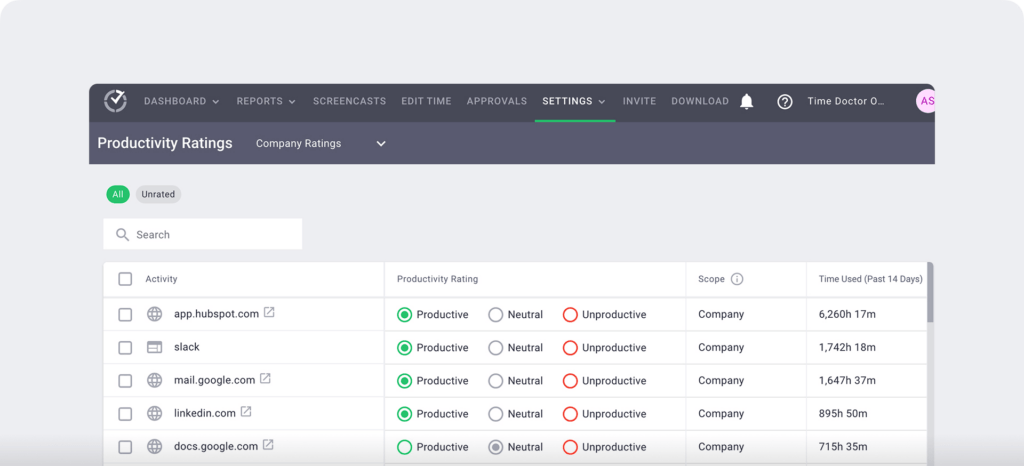
When employees use Time Doctor to track their work time, the software automatically monitors the websites and apps they’re using. The platform tracks how much time each team member spends on productive versus unproductive tasks.
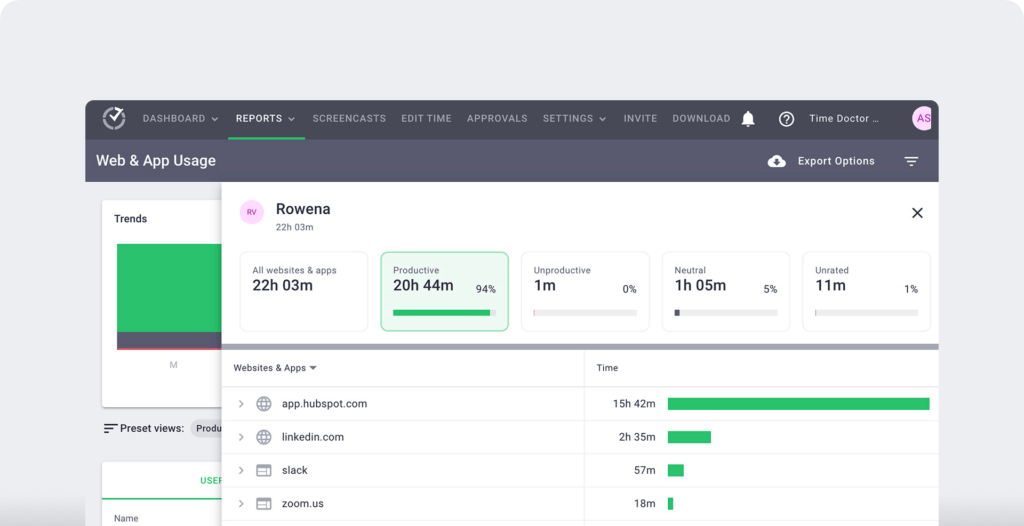
Then it generates insights you can use to measure productivity at a glance. You can easily see which employees and teams are most productive compared to those struggling to set boundaries between work and leisure. When necessary, you can take steps to help unproductive teams and employees stay on task.
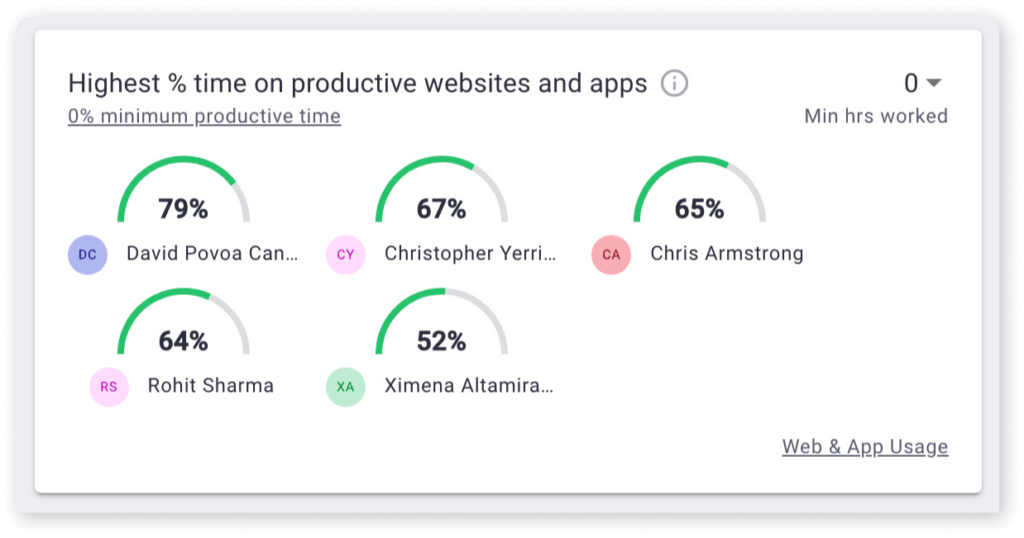
5. Differentiate remote and in-office tasks
If you require employees to spend a certain number of days in the office each week or month, make that time worthwhile. Reserve in-office time for in-person and collaborative work, and leave remote hours for more independent work.
For example, employees shouldn’t spend their in-office days attending virtual meetings or sending instant messages. Likewise, employee work-from-home days shouldn’t involve joining strategy sessions or networking events.
To help your team differentiate between the two and make better use of both, try these tips:
- Create shared calendars where employees can track team members’ working locations and plan meetings accordingly.
- Schedule strategy sessions and staff meetings when most team members will be in the office.
- Encourage your team to manage solo tasks while working from home, and give them the tech they need to succeed.
6. Prioritize company culture
Establishing a consistent company culture and measuring the effects is easy for in-office teams. But in hybrid environments that prioritize remote work, company culture often seems like an afterthought.
For many hybrid teams, a lack of culture can be a serious problem—and even impact employee retention. For example, the Cisco study indicates that nearly 75% of hybrid employees want their company to rethink its culture. Likewise, the HubSpot study shows that over 40% of hybrid employees want more team-building activities.
Use these ideas to reinforce your company culture both in the office and during remote working hours:
- Plan quarterly or annual in-person events that involve the entire team, such as staff meetings or conferences.
- Create rituals for remote meetings, such as asking a question of the week or letting employees share personal updates.
- Allow time to recognize employees for performance and achievements at both on-site and virtual meetings.
7. Request and act on feedback
When your team spends less time in the office, employees may have fewer opportunities to connect with managers, leading to visibility concerns. Employees who don’t feel seen or heard may look elsewhere, creating low morale and expensive employee retention issues.
As you shift to a hybrid workplace, create space to accept and process feedback. A McKinsey study on hybrid work found that allowing two-way feedback can increase respect and lead to a more inclusive workspace.
Use these tips to improve your feedback approach while prioritizing inclusion:
- Set a schedule for accepting feedback. For example, you might request input weekly or after certain events.
- Make time to respond to feedback. For example, managers might reply within a specific time frame or during one-on-ones.
- Create a structure for processing feedback. For example, you might distribute ideas for review and implementation.
8. Design a framework for advancement
As much as employees might appreciate the healthy work-life balance that more flexible work arrangements allow, they may also have serious concerns. Some might wonder how hybrid work will affect their career path or earning potential.
In fact, the Cisco study found that over 40% of hybrid employees believe that remote and in-office workers lack equal opportunities for advancement. Nearly 60% think in-office workers will have better career growth, suggesting that remote workers face a unique challenge.
When your employees work in several locations and have very different amounts of face-to-face time with managers, ensuring they all have similar opportunities to grow their careers is critical. Here are a few ideas to build your framework:
- Conduct performance reviews on a set schedule. Whether you opt for quarterly or annual performance reviews, provide regular evaluations and feedback.
- Create internal promotion guidelines. Help employees understand what the opportunities are within the organization and what it takes to get there.
- Offer professional development resources. Give employees opportunities to learn and improve outside their daily tasks so they can be proactive about career growth.
Try the tool designed to help hybrid teams be more productive
Ready to take a step in the right direction with a software platform designed for hybrid teams? Get a free trial of Time Doctor and start monitoring team attendance, workloads, and productivity today.
Frequently asked questions (FAQs)
1. How do you ensure productivity in a hybrid work model?
Ensuring productivity in a hybrid workforce requires clear communication, the right tools, and well-defined performance metrics. Managers should set clear expectations and goals, provide employees with productivity tools such as Time Doctor, and monitor output rather than hours worked. Additionally, regular check-ins, collaboration platforms, and feedback loops can help maintain productivity across both in-office and remote teams.
2. What are the challenges of hybrid workforce management?
Managing a hybrid workforce comes with several challenges, including communication gaps, unequal access to resources, and potential feelings of isolation among remote workers. In-office employees may receive more recognition and advancement opportunities, creating a disparity. Additionally, managers must navigate compliance with labor laws across different locations and ensure that cybersecurity measures are robust for remote workers.
3. How can hybrid teams maintain company culture?
Maintaining company culture in a hybrid model requires intentional efforts to create both virtual and in-person team-building activities. Leaders can schedule regular virtual meetings, offer flexible socialization opportunities, and plan periodic in-person events to foster relationships. Providing consistent recognition, creating rituals in remote meetings, and establishing shared goals can also strengthen company culture, no matter where employees are working.
4. How do you handle performance reviews in a hybrid workforce?
To ensure fairness, performance reviews in a hybrid workforce should be based on results and measurable outcomes rather than time spent in the office. Organizations should establish clear performance metrics for all employees, regardless of location, and schedule regular reviews to ensure all team members have equal opportunities for growth and development.
5. What are some essential tools for hybrid workforce management?
Key tools for hybrid workforce management include communication platforms like Slack or Microsoft Teams, project management software such as Trello or Asana, and workforce analytics tools like Time Doctor. Additionally, organizations may need video conferencing software (Zoom), document-sharing tools (Google Workspace or Microsoft 365), and virtual collaboration apps to ensure seamless hybrid operations.
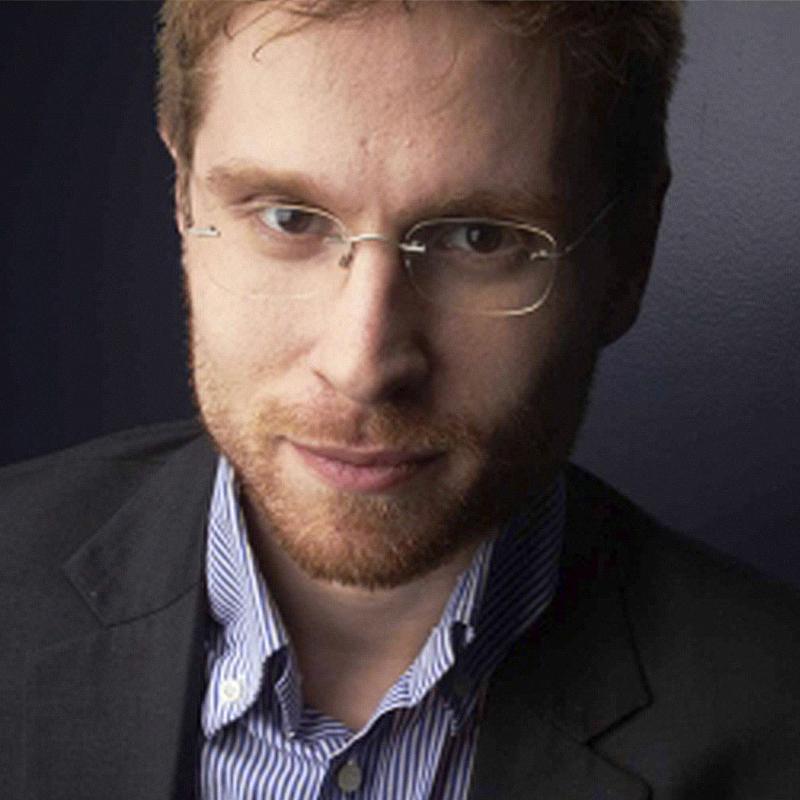
Liam Martin is a serial entrepreneur, co-founder of Time Doctor, Staff.com, and the Running Remote Conference, and author of the Wall Street Journal bestseller, “Running Remote.” He advocates for remote work and helps businesses optimize their remote teams.
